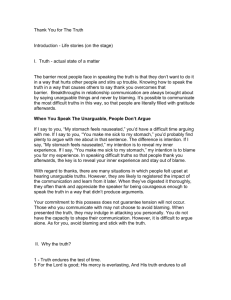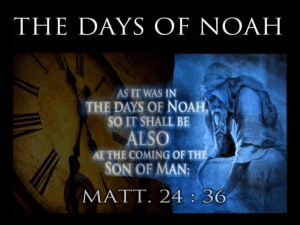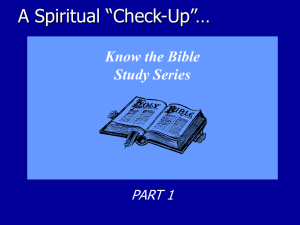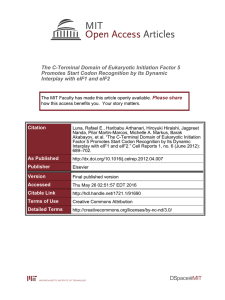What You Know and How You Know It
advertisement
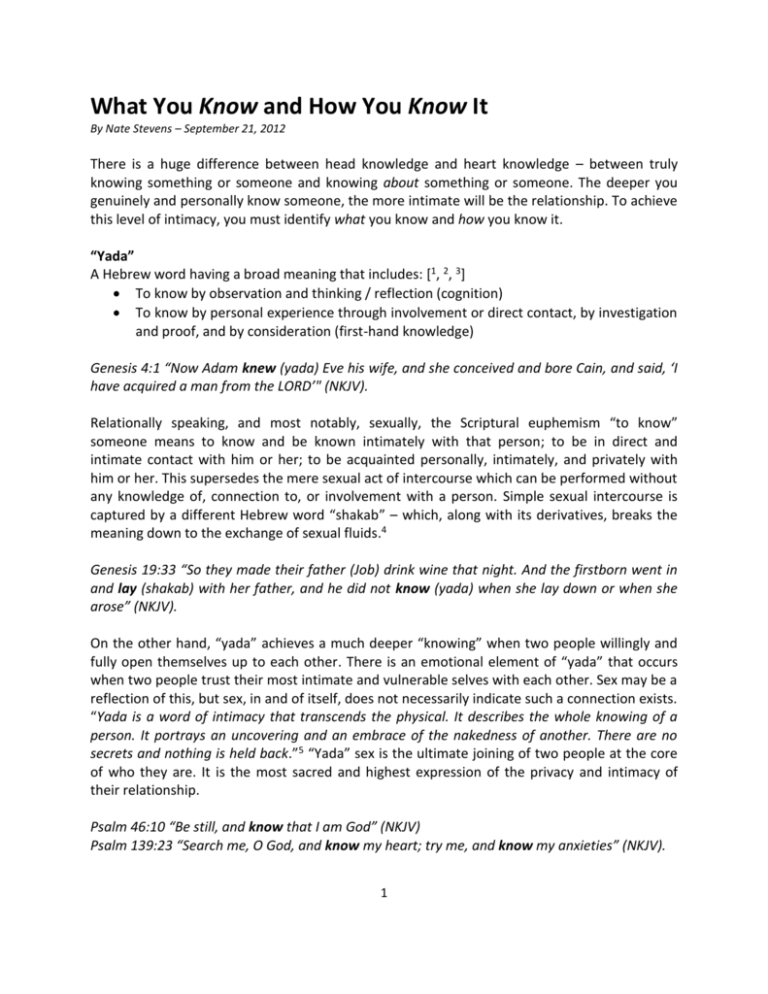
What You Know and How You Know It By Nate Stevens – September 21, 2012 There is a huge difference between head knowledge and heart knowledge – between truly knowing something or someone and knowing about something or someone. The deeper you genuinely and personally know someone, the more intimate will be the relationship. To achieve this level of intimacy, you must identify what you know and how you know it. “Yada” A Hebrew word having a broad meaning that includes: [1, 2, 3] To know by observation and thinking / reflection (cognition) To know by personal experience through involvement or direct contact, by investigation and proof, and by consideration (first-hand knowledge) Genesis 4:1 “Now Adam knew (yada) Eve his wife, and she conceived and bore Cain, and said, ‘I have acquired a man from the LORD’" (NKJV). Relationally speaking, and most notably, sexually, the Scriptural euphemism “to know” someone means to know and be known intimately with that person; to be in direct and intimate contact with him or her; to be acquainted personally, intimately, and privately with him or her. This supersedes the mere sexual act of intercourse which can be performed without any knowledge of, connection to, or involvement with a person. Simple sexual intercourse is captured by a different Hebrew word “shakab” – which, along with its derivatives, breaks the meaning down to the exchange of sexual fluids.4 Genesis 19:33 “So they made their father (Job) drink wine that night. And the firstborn went in and lay (shakab) with her father, and he did not know (yada) when she lay down or when she arose” (NKJV). On the other hand, “yada” achieves a much deeper “knowing” when two people willingly and fully open themselves up to each other. There is an emotional element of “yada” that occurs when two people trust their most intimate and vulnerable selves with each other. Sex may be a reflection of this, but sex, in and of itself, does not necessarily indicate such a connection exists. “Yada is a word of intimacy that transcends the physical. It describes the whole knowing of a person. It portrays an uncovering and an embrace of the nakedness of another. There are no secrets and nothing is held back.”5 “Yada” sex is the ultimate joining of two people at the core of who they are. It is the most sacred and highest expression of the privacy and intimacy of their relationship. Psalm 46:10 “Be still, and know that I am God” (NKJV) Psalm 139:23 “Search me, O God, and know my heart; try me, and know my anxieties” (NKJV). 1 Proverbs 3:5-6 “Trust in the LORD with all your heart, and lean not on your own understanding; in all your ways acknowledge Him, and He shall direct your paths” (NKJV). Jeremiah 1:5 “Before I formed you in the womb I knew you” (NKJV) Ezekiel (multiple verses) “…and you shall know that I am the LORD” (NKJV). Spiritually speaking, God wishes to establish this intimate relationship with each and every person. To fully know Him and to be intimately known by Him is the goal. With His omniscience, He already knows us better than we know ourselves. However, His desire is for us to acknowledge Him, trusting that He has our best interests at heart and obeying Him fully, while also getting to know who He truly is. John 14:6 confirms that no one comes to God the Father except through Jesus Christ. Our ultimate fulfillment comes from beginning a personal relationship with Jesus Christ where He is accepted as Lord and Savior. Then, just as with other relationships, we must cultivate it, nourish it, and value it. How? By spending time reading His Word. By spending quiet time in prayer, praise, and meditation. By listening for His voice and following His direction. By opening up more and more each day to His Spirit and allowing Him to transform us into Christlikeness. Comparatively, just as two individuals in marriage seek to know each other intimately, to intimately know Him and to be intimately known by Him requires our willing openness and emotional vulnerability with Him, our daily discovery as to who He is, our wholehearted trust in Him, and our complete union with Him. “Eido” A Greek word collectively meaning: [6, 7, 8] To perceive with the outer senses, particularly with physical sight; to perceive, comprehend, understand with the mind To know intuitively; to know or have knowledge from observation, but not personal experience. Matthew 4:21 "Let your light so shine before men, that they may see your good works and glorify your Father in heaven” (NKJV). Matthew 22:29 “Jesus answered and said to them, ‘You are mistaken, not knowing the Scriptures nor the power of God’” (NKJV). Matthew 24:43 "But know (ginosko) this, that if the master of the house had known (eido) what hour the thief would come, he would have watched and not allowed his house to be broken into” (NKJV). John 1:26 “John answered them, saying, ‘I baptize with water, but there stands One among you whom you do not know’” (NKJV). John 4:25 “The woman said to Him, ‘I know that Messiah is coming’ (who is called Christ). ‘When He comes, He will tell us all things’”(NKJV). This “knowing” is more of a head knowledge that expresses the fact the known object or person has simply come within the scope of the knower’s perception. There is no intimate or personal knowledge, simply an acquaintance. For example, I am acquainted with (know about) the President of the United States, however I do not personally know him nor does he 2 personally know me. This “knowing” is similar to the shallow, superficial relationship of mere acquaintances. There is a certain level of relationship, but it lacks the strong emotional connection of true intimacy. It is representative of the relationship between colleagues and work associates, but not best friends. There may be shared surface-level commonalities but nothing of genuine mutual interest that warrants deep communication, constant time spent together, or mutual enjoyment in each other’s presence. In this guarded state where trust has not been established, nothing of a deeply personal or intimate level is shared or known. From a spiritual perspective, many people “eido” know about Jesus Christ. They’ve read many facts about Him, studied His life, understood His Messianic claims, and possibly even worshipped in His name. However, they’ve never entered into a personal relationship with Him – allowing Him access to their most inner core and receiving His transformational new birth of their spirit. They know about Him (eido), but they do not truly know Him (ginosko). “Ginosko” A Greek word collectively meaning: [9, 10, 11] To come to know, realize, recognize, or understand completely To know experientially, personally, intimately Matthew 1:25 “…and (Joseph) did not know her till she had brought forth her firstborn Son. And he called His name JESUS” (NKJV). Matthew 7:23 "Many will say to Me in that day, 'Lord, Lord, have we not prophesied in Your name, cast out demons in Your name, and done many wonders in Your name?' And then I will declare to them, 'I never knew you; depart from Me, you who practice lawlessness!’” (NKJV). Luke 6:44 “For every tree is known by its own fruit” (NKJV). I John 2:3 “Now by this we know that we know Him, if we keep His commandments.” This “knowing” is more of a heart knowledge and often indicates a relation between the person knowing and the object known. What is known is of value or importance to the one who knows, hence the reason or basis for the relationship. It frequently suggests a progression in knowledge while also implying an active relation between the one who knows and the person or thing known. The “eido” progression may ultimately lead to “ginosko” – but not always. I John 3:2, 6 “Beloved, now we are children of God; and it has not yet been revealed what we shall be, but we know (eido – intuitively since it is futuristic) that when He is revealed, we shall be like Him, for we shall see Him as He is. Whoever abides in Him does not sin. Whoever sins has neither seen Him nor known (ginosko – experientially based on a personal relationship) Him. (NKJV) One great way to identify the difference between “eido” knowing and “ginosko” knowing is by considering the celestial moon. “Eido” knowledge confirms the lunar object’s position in space, identifies its lunar cycles, understands its impact on the oceans’ tides, and appreciates the potential for nostalgic and romantic feelings when gazing at its nightly glow. However, 3 “ginosko” knowledge occurred when Neil Armstrong actually stepped onto the lunar surface and personally experienced it on July 20, 1969, at 10:56 pm ET, when he made his “one small step for man, one giant leap for mankind.”12 We all “eido” know the moon exists; however, Neil Armstrong “ginosko” knows it more intimately based on his personal experience with it. Personal Application Questions: 1. How intimate and personal is your relationship with God? 2. Do you personally and intimately know Jesus Christ or do you merely know about Him? 3. Does Jesus know you – are you genuinely one of His own? 4. How are you nurturing and growing your relationship with God? 5. How do you demonstrate your gratefulness for the relationship with and love for Him? 1 James Strong, Strong’s Exhaustive Concordance, Hebrew and Chaldee Dictionary Accompanying the Exhaustive Concordance, word #3045 (Crusade Bible Publishers, Inc., 1980), 47. 2 Spiros Zodhiates, Th.D, The Hebrew-Greek Study Bible, King James Version, Lexical Aids to the New Testament, word #3045 (AMG International, Inc. DBA AMG Publishers, 1991), 1618. 3 W. E. Vine, Nelson’s Quick Reference – Vine’s Dictionary of Bible Words, word #3045 (Thomas Nelson Publishers, 1997), 384. 4 James Strong, Strong’s Exhaustive Concordance, Hebrew and Chaldee Dictionary Accompanying the Exhaustive Concordance, words #7901, 7902, 7903 (Crusade Bible Publishers, Inc., 1980), 115. 5 Dannah Gresh, What are you waiting for? The One Thing No One Ever tells You About Sex, (WaterBrook Press, 2011), 24. 6 James Strong, Strong’s Exhaustive Concordance, Greek Dictionary Accompanying the Exhaustive Concordance, word #1492 (Crusade Bible Publishers, Inc., 1980), 25. 7 Spiros Zodhiates, Th.D, The Hebrew-Greek Study Bible, King James Version, Lexical Aids to the New Testament, word #1492 (AMG International, Inc. DBA AMG Publishers, 1991), 1710. 8 W. E. Vine, Nelson’s Quick Reference – Vine’s Dictionary of Bible Words, word #1492 (Thomas Nelson Publishers, 1997), 385. 9 James Strong, Strong’s Exhaustive Concordance, Greek Dictionary Accompanying the Exhaustive Concordance, word #1097 (Crusade Bible Publishers, Inc., 1980), 20. 10 Spiros Zodhiates, Th.D, The Hebrew-Greek Study Bible, King James Version, Lexical Aids to the New Testament, word #1097 (AMG International, Inc. DBA AMG Publishers, 1991), 1700. 11 W. E. Vine, Nelson’s Quick Reference – Vine’s Dictionary of Bible Words, word #1097 (Thomas Nelson Publishers, 1997), 384. 12 Jennifer Rosenberg, First Man on the Moon, http://history1900s.about.com/od/1960s/p/firstmanmoon.htm, accessed September 16, 2012. 4

